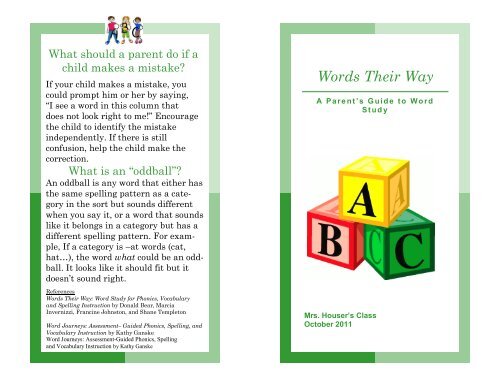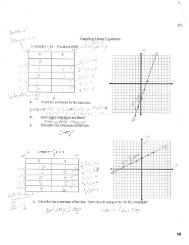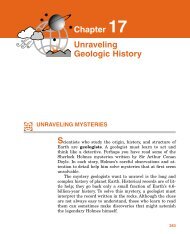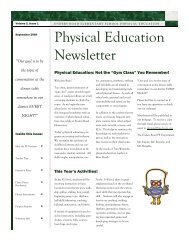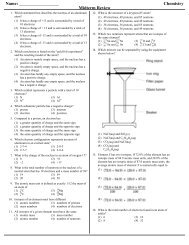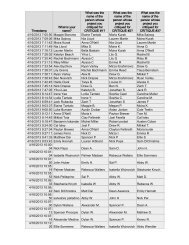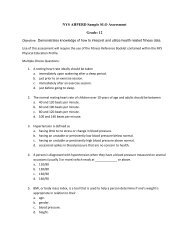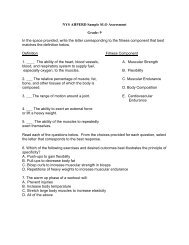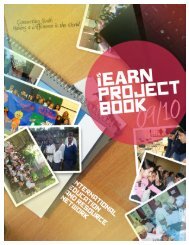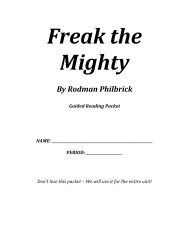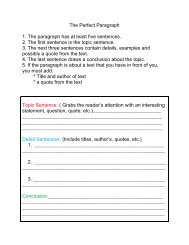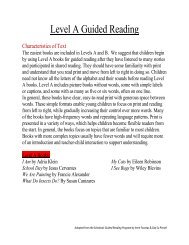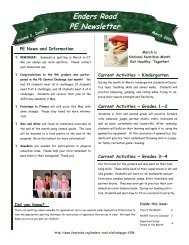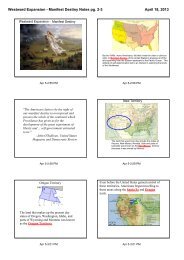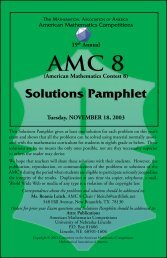Words Their Way Parent Guide
Words Their Way Parent Guide
Words Their Way Parent Guide
Create successful ePaper yourself
Turn your PDF publications into a flip-book with our unique Google optimized e-Paper software.
What should a parent do if a<br />
child makes a mistake?<br />
If your child makes a mistake, you<br />
could prompt him or her by saying,<br />
―I see a word in this column that<br />
does not look right to me!‖ Encourage<br />
the child to identify the mistake<br />
independently. If there is still<br />
confusion, help the child make the<br />
correction.<br />
What is an ―oddball‖?<br />
An oddball is any word that either has<br />
the same spelling pattern as a category<br />
in the sort but sounds different<br />
when you say it, or a word that sounds<br />
like it belongs in a category but has a<br />
different spelling pattern. For example,<br />
If a category is –at words (cat,<br />
hat…), the word what could be an oddball.<br />
It looks like it should fit but it<br />
doesn’t sound right.<br />
References<br />
<strong>Words</strong> <strong>Their</strong> <strong>Way</strong>: Word Study for Phonics, Vocabulary<br />
and Spelling Instruction by Donald Bear, Marcia<br />
Invernizzi, Francine Johnston, and Shane Templeton<br />
Word Journeys: Assessment– <strong>Guide</strong>d Phonics, Spelling, and<br />
Vocabulary Instruction by Kathy Ganske<br />
Word Journeys: Assessment-<strong>Guide</strong>d Phonics, Spelling<br />
and Vocabulary Instruction by Kathy Ganske<br />
<strong>Words</strong> <strong>Their</strong> <strong>Way</strong><br />
A P a r e n t ’ s G u i d e t o W o r d<br />
S t u d y<br />
Mrs. Houser’s Class<br />
October 2011
Page 2<br />
What is Word Study?<br />
Word study is a learner-centered, conceptual<br />
approach to instruction in<br />
phonics, spelling, word recognition,<br />
and vocabulary. This program has<br />
been developed through over thirty<br />
years of ongoing educational research.<br />
―Through active exploration, word<br />
study teaches students to increase general<br />
word knowledge by examining<br />
words to discover the regularities, patterns,<br />
and conventions of English spelling<br />
needed to read and write. Word<br />
study also increases specific word<br />
knowledge—the spelling and meaning<br />
of individual words.‖ ―A word study<br />
program that explicitly teaches students<br />
necessary skills and engages<br />
their interest and motivation<br />
to learn about how words work is a vital<br />
aspect of any literacy program.‖<br />
Reading, writing and spelling are all<br />
closely connected, so utilizing word<br />
study instruction helps students<br />
develop overall literacy skills.<br />
Word Study Homework<br />
Monday: Cut apart picture/word cards<br />
for the week and sort them like we did<br />
at school.<br />
Tuesday: Do a speed sort, timing how<br />
fast you can correctly sort your cards.<br />
Sort your cards again and try to beat<br />
your first time.<br />
Wednesday: Write your 4 word wall<br />
words in sentences making sure that<br />
you used capitals, periods (or other<br />
ending punctuation), and correctly<br />
spelled word wall words.<br />
Thursday: Do a quick quiz. Have a<br />
parent read your cards to you and try<br />
to spell the words on your own.<br />
Turn in homework on Friday.<br />
***Every Night***<br />
Practice reading and writing word<br />
wall words (using lowercase letters)<br />
Page 7
Page 6<br />
Activities included in Word<br />
Study<br />
Word /Picture Sorts: Students are<br />
given categories or features by which<br />
to sort their cards. On the first day of<br />
a new sort these sorts are done together.<br />
Later in the week, students resort<br />
their cards independently.<br />
Speed Sort: Students sort their words<br />
as fast as they can (using a timer or<br />
clock with a second hand). They check<br />
for accuracy. Then do the sort again<br />
trying to beat the previous time.<br />
Word Hunt: Students become word detectives,<br />
searching for words with the<br />
features they are learning about this<br />
week.<br />
Writing Sentences/<strong>Words</strong>: Students<br />
will practice writing word wall words<br />
in sentences and words from their<br />
weekly sort at word work and center<br />
times.<br />
...and many other activities! We like to<br />
have lots of variety in first grade to<br />
help keep learning fun!<br />
How does Word Study look<br />
in the classroom?<br />
Word study instruction is provided in<br />
small groups based on students’ specific<br />
developmental spelling stages.<br />
Students are taught at their instructional<br />
level—a level that is not too difficult<br />
or too easy and matches their<br />
specific needs based on assessment.<br />
During word study instruction,<br />
words and pictures are sorted in<br />
hands-on learning activities that require<br />
children to examine, discriminate,<br />
and make critical judgments<br />
about speech sounds, spelling patterns,<br />
and word meanings. Students compare<br />
and contrast categories of word features<br />
to discover similarities and differences<br />
between categories. The word<br />
features that students learn during<br />
sorts are then applied to new words in<br />
reading and writing, allowing them to<br />
generalize the features learned to new<br />
material.<br />
Page 3
Page 4<br />
How do teachers plan for word<br />
study instruction?<br />
Students are assessed at the beginning<br />
of the year to determine their<br />
current level of spelling development.<br />
Teachers plan instruction for small<br />
groups that focuses on spelling and<br />
sound features that students<br />
need to learn. Most students will take<br />
a weekly spelling test to assess understanding<br />
of the focused features. Informal<br />
assessments are conducted<br />
through students’ weekly word<br />
study work, as well as their writing<br />
across the curriculum areas. At the<br />
end of the week, based on informal<br />
and formal assessments, new features<br />
are chosen for the following week.<br />
Students will also get 4 new word wall<br />
words each week. These words are<br />
based on the sight words students<br />
need to know in their reading and<br />
words they are frequently using in<br />
their writing.<br />
How are students taught to<br />
sort?<br />
Before the Sort:<br />
Review the headings (sound or pattern<br />
or both)<br />
Sort a few examples with the student<br />
During the Sort:<br />
• Ask the student to read and sort<br />
each word<br />
Discuss unknown word meanings<br />
After the Sort:<br />
• Have the student read down each<br />
column<br />
• Help the student find and correct<br />
mistakes<br />
• Ask the student to explain what was<br />
the same about the words in each column<br />
(sound, pattern or both)<br />
Page 5


